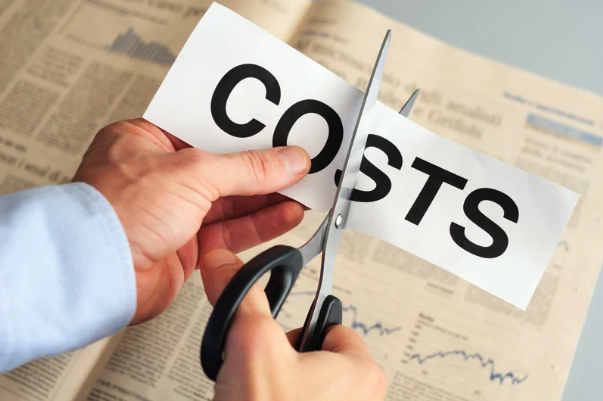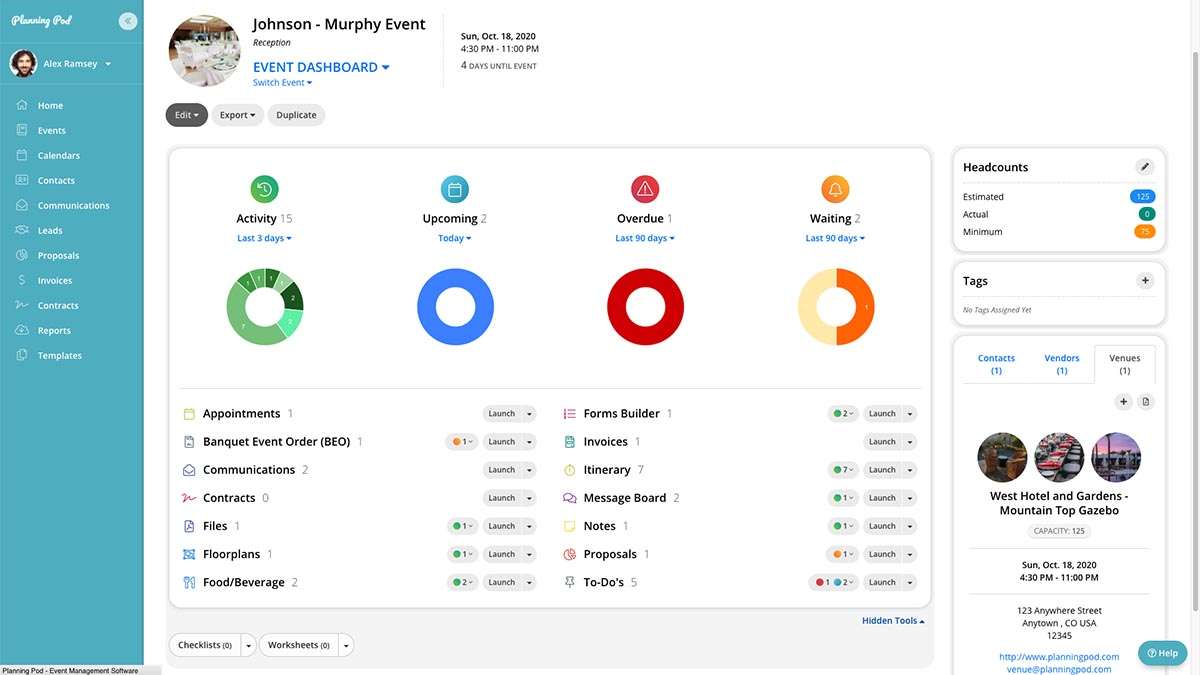Event businesses often operate on thin margins, making it essential to your success to carefully manage costs.
In this article, we'll delve into various strategies to minimize operational costs and unnecessary expenses for your event business. From vendor and supplier negotiations to technology investments, we're here to provide actionable tips and insights to help you optimize your financial performance.
Vendor and supplier costs
Negotiating better deals with vendors and suppliers can be a game changer when it comes to reducing costs. If you haven’t already done so, start by building strong relationships with vendors and establishing yourself as a valued partner. This can lead to more favorable terms, discounts, and exclusive offers in the future.
It’s also worth considering alternative options for high-cost items like catering and venue rental. For example, if you’re an event planner you might explore local restaurants for catering or consider unique venues like historic buildings or outdoor spaces that offer lower rental rates. And depending on the vendor and what they provide, bundling services can also result in better rates - they may be willing to offer discounts for multiple services.
If you run an event venue, you might be able to leverage bulk purchasing discounts. By negotiating with suppliers for larger quantities of materials or services, you can often secure significant price reductions. And paying upfront or early can sometimes lead to discounts as it can provide suppliers with greater financial certainty.
Another approach is to consolidate your vendor base. By reducing the number of vendors you work with, you can increase your purchasing power and negotiate more favorable terms. This can be particularly beneficial for items that are frequently used or purchased in large quantities.
To ensure vendor reliability while reducing costs, conduct thorough research and due diligence before selecting vendors. Check references, review online reviews, and request quotes from multiple vendors to compare prices and services. Simultaneously, identify your core items and conduct thorough market research. By understanding local market rates for essential goods and services, you can make informed decisions about where to source your supplies and negotiate better deals.
Staffing and labor costs
Optimizing staffing levels is essential not only for controlling labor costs, but for keeping your team efficient and satisfied.
One strategy that can easily pay for the time it requires in savings: creating detailed event timelines and task lists to identify the exact number of staff needed for each role. This will help you avoid overstaffing and reduce unnecessary labor expenses, like overtime compensation.
A few strategies to reduce overtime costs include:
- Effective scheduling: Plan your shifts carefully to minimize the need for overtime, and consider staggered shifts or flexible work arrangements.
- Cross-training staff: Train your team members to perform multiple tasks, allowing you to maneuver them accordingly to cover shifts as efficiently as possible.
- Outsourcing non-core tasks: Consider outsourcing non-core tasks, like cleaning or security, to reduce in-house labor costs.
One more thing - leveraging technology can also significantly reduce labor needs. A comprehensive event management platform can streamline task management, communication, lead nurturing, business reporting, and more … to free up your time as well as your team’s.

Operational costs
If you’re looking for a simple yet effective way to cut costs, look no further than reducing energy consumption at your events. Think about using energy-efficient lighting, appliances, and equipment. Depending on the vibe of your event, you can also encourage attendees to bring reusable water bottles and cups to minimize waste.
Waste reduction strategies can also significantly impact operational costs and contribute to a more sustainable event. By implementing recycling programs, you can divert recyclable materials from landfills and even potentially generate revenue. Composting food waste helps reduce landfill waste and creates valuable compost for gardens or landscaping. These strategies not only help the environment but also improve your event's sustainability reputation and can attract environmentally conscious clients and attendees.
And let’s not forget about optimizing transportation and logistics to save money. Consider using public transportation or carpooling options for staff and attendees. Or, explore cost-effective shipping methods for equipment and negotiate better rates with transportation providers.
Cost-effective alternatives to traditional event equipment can also significantly reduce expenses without compromising the quality of your event. Instead of purchasing new equipment, consider renting items like tables, chairs, and lighting from local rental companies (especially for one-time events). You could also purchase used equipment from online marketplaces or local suppliers - that can often be found at a fraction of the cost of new items. And with proper maintenance, it can serve your needs just as well.
Another way to cut operational costs is to minimize the cost of materials used in your business. Caterers, for instance, can examine their food waste to find opportunities for cost savings. By adjusting portion sizes or opting for less expensive ingredients, you can improve your profit margins without sacrificing customer satisfaction. Similarly, using more affordable napkins, decorations, or wine selections can significantly impact your bottom line, enabling you to invest in other areas that enhance the customer experience.
Marketing and advertising costs
The golden rule of cost-effective marketing: measuring your ROI (return on investment). Tracking this metric is essential for determining which channels are most effective and allocating your budget accordingly. Use tools like Google Analytics and Hubspot to track website traffic, social media engagement, and conversions to measure the effectiveness of your marketing campaigns.
Outside of paid advertising, which can add up quickly, a few cost-effective marketing channels include:
- Social media: Leverage social media platforms to reach your target audience for free (or low cost if you run ads).
- Content marketing: Create high-quality content like blog posts, articles, and videos to attract and engage your audience and improve your search engine optimization.
- Email marketing: Build an email list and send targeted campaigns to nurture leads and drive sales.
- Public relations: Seek media coverage to increase brand visibility and credibility.
Building a loyal customer base can also help reduce marketing expenses. It’s never a bad idea to offer excellent customer service, loyalty programs, and exclusive perks that might encourage repeat business and referrals.

Technology and software costs
Cost-effective event management software options can significantly streamline operations, reduce manual tasks, and improve overall efficiency. Before selecting software, it is of vital importance to carefully research different solutions and find one that aligns with your specific needs and budget. Always consider factors like features, pricing, scalability, and quality of customer support.
Once you've narrowed down your options, your future self will thank you for choosing software that is user-friendly and integrates seamlessly with any other systems you use (like your accounting software or email marketing platform). This integration can help streamline data flow and reduce errors.
To ensure your staff can use the software effectively, be sure to provide adequate training and support as you onboard a new platform. This may include online tutorials, workshops, or one-on-one training sessions (something to look out for when evaluating what different platforms in customer success).
Though it might cause a small increase in your costs upfront, you'll help your team maximize the benefits of the software and avoid costly mistakes going forward. Plus the right software will enable you to see much bigger returns in time saved and revenue growth.
Financial management
As any event business owner knows, improving cash flow management is crucial for ensuring the financial health of your event business. If you implement strategies like invoicing promptly, offering early payment discounts, and negotiating favorable payment terms with suppliers, you can significantly offset other costs associated with running your business.
Budgeting and forecasting tools are essential for controlling costs. These tools provide a clear and comprehensive overview of your current and future financial situation, allowing you to track income and expenses, identify areas for cost-cutting, and make informed decisions about your business.
Creating detailed budgets allows you to set realistic financial goals and monitor your progress towards achieving them. And forecasting tools can help you predict future revenue and expenses, enabling you to anticipate potential challenges and make proactive adjustments to your budget. Through the consistent use of tools like this, you can optimize your resource allocation, minimize unnecessary expenses, and make data-driven decisions to improve your business's overall financial performance.
Conclusion
By implementing strategic cost-saving measures, event businesses can significantly reduce operational expenses without compromising the quality of their events.
Negotiating better deals with vendors, optimizing staffing levels, reducing energy consumption, and minimizing waste can all contribute to a more profitable and sustainable business. And leveraging technology and effective financial management practices can further enhance cost control and efficiency. By carefully considering these strategies and tailoring them to your specific business needs, you can optimize your operations and achieve long-term success in the competitive event industry.







